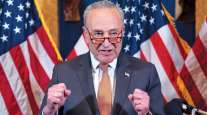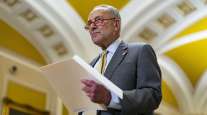Collins Blasts DOT Fiscal 2016 Budget Plan As ‘Unrealistic’ for Fixing Highway Fund

This story appears in the April 27 print edition of Transport Topics.
WASHINGTON — The Obama administration’s fiscal 2016 budget plan falls short of resolving the country’s long-term transportation funding crisis, Sen. Susan Collins told Transportation Secretary Anthony Foxx at an appropriations committee hearing.
“Simply saying that we are happy to work with Congress is not an acceptable answer,” Collins (R-Maine), the chamber’s transportation funding leader, said April 22. “This administration has had six years to provide Congress with specific proposals to reform” the Highway Trust Fund.
Collins also called aspects of the U.S. Department of Transportation’s latest budget proposal “unrealistic.”
Responding to Collins, the secretary said that, while “there are lots of academic ideas” on how to resolve the trust fund’s looming shortfall, “at some level, it becomes a question of what can get the political support to actually pass.”
Funding authority for transportation programs expires May 31, and Foxx indicated the fund’s payout to states for infrastructure projects could stretch through June. After the hearing, Foxx told reporters that several states have started to slow down work on various highway projects. The Republican-led Congress has yet to formally consider a measure to sustain the trust fund after May.
The administration’s $95 billion plan for fiscal 2016, which would mark the start of the six-year, $478 billion Grow America Plan for reauthorizing highway programs, is unlikely to advance through the chambers.
A significant portion of the proposal would be used to boost freight and grant programs. Republicans, for the most part, oppose the plan because it would be financed partly with revenue from a one-time 14% tax on earnings that U.S. corporations have kept overseas.
Last year, a $1 trillion fiscal 2015 funding law that included every federal agency provided DOT with $500 million for Transportation Investment Generating Economic Recovery grants, and a provision Collins sponsored that suspended a part of an hours-of-service rule for truck drivers was included in the law.
At the hearing, Foxx reassured senators his department’s trucking regulatory agency, the Federal Motor Carrier Safety Administration, is aiming to complete a study on the suspended restart portion of the HOS rule that Congress required this year.
“We’ve hired a consultant to perform the study,” Foxx told Sen. Roy Blunt (R-Mo.). “We’re proceeding on pace with that. I hope we’re able to meet the deadline that Congress has established.”
Foxx added that the process would be transparent, probably responding to concerns several members of Congress recently raised about FMCSA’s handling of the study.
This month, Rep. Richard Hanna (R-N.Y.), a member of the House Transportation and Infrastructure Committee, called on Foxx to ensure the study includes comparative data on safety-critical events, such as crashes, near-crashes and crash-relevant conflicts, which occur during the rush hours of 5 a.m. to 9 a.m. Hanna also took issue with the agency’s selection of the Virginia Tech Transportation Institute to perform the study, saying that the school in 2011 had conducted a “highly criticized” HOS study.
Last week, FMCSA announced that it still is seeking volunteers industrywide for the study on the HOS rule’s effects on safety and driver alertness.
Also at the hearing, Sen. Steve Daines (R-Mont.) asked Foxx why the administration had not yet announced nominees to fill top DOT agency posts full time.
Foxx told the senator there are people who would be qualified to oversee five agencies with acting administrators, such as FMCSA, the Federal Railroad Administration, the Pipeline and Hazardous Materials Safety Administration, the Federal Highway Administration and the Federal Transit Administration. But the duration and scrutiny of a typical confirmation is a main reason why the White House has yet to present the Senate with such nominees.




